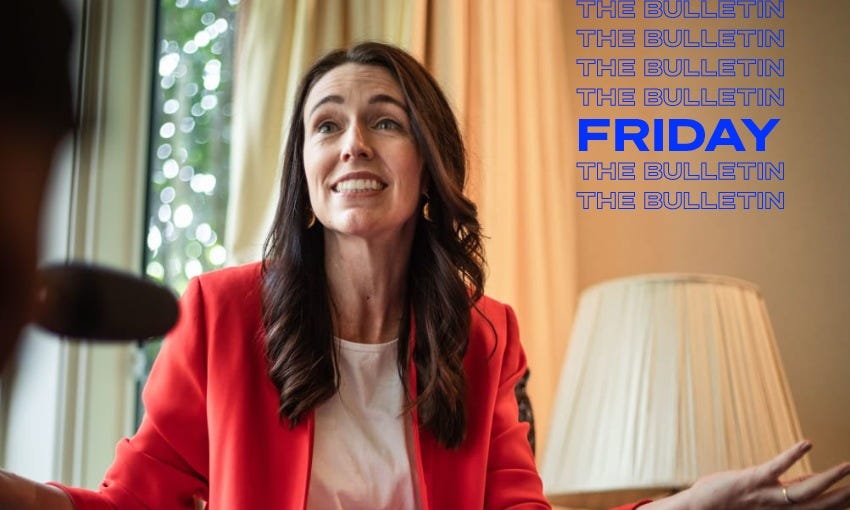The PM's summer of pared back thinking
In a round of end of year interviews, the prime minister confirmed the government will pare things back in 2023 to focus on economic issues and that some retirements will be announced next week
In today’s edition: a Commerce Commission success story; turning the nation’s happiness into data; Black Ferns dominate at rugby awards but first, the prime minister confirms a reset, a reprioritisation and a round of retirements
The prime minister outlines plans for a reset in the new year (Photo: RNZ / Samuel Rillstone)
Paring things back for 2023
Prime minister Jacinda Ardern’s round of end-of-year interviews were aired and published last night. Of note was an indication that the summer break will be used to think about “areas that we can pare back” and that 2023’s focus has to be about “the economic challenges we have in front of us.” Newsroom's Jo Moir picked up that ball first on Tuesday and Toby Manhire ran it long on Wednesday, with some indications of what may end up going by the wayside. Moir, with her third break this week, confirms this morning that Willie Jackson will take a recommendation to cabinet next week to halt work on a draft plan designed to meet commitments made under the United Nations Declaration on the Rights of Indigenous People (UNDRIP).
“A handful of retirements”
As far as powers of prediction go, I’d like to point out that the prime minister’s observation that “people are tired” was also a blindingly obvious call I made this week. I really need to find a new line to hit the Christmas parties with because I’ve been saying it for two months now. Ardern also revealed that there will be announcements next week about a “handful of retirements.” Jo Moir reported that cabinet minister David Clark is set to announce he’s retiring from parliament at the next election. Local government minister Nanaia Mahuta confirmed on Wednesday that she has no plans to step down at the next election. Ardern said Mahuta was “an important part of our team and she has a huge contribution to continue to make."
National continues calls for Mahuta to be sacked
The Water Services Entities Bill passed its third and final reading yesterday. In the end only Labour, with its majority, backed it. The Greens withdrew their support over concerns about privatisation. During debate yesterday, the National party continued the call for Mahuta to be sacked. National MPs Chris Bishop, Simon Watts and Nicola Willis all pressed the government on it with Mahuta, Grant Robertson and Kiritapu Allan on the receiving end of questions about the entrenchment provision and whether Mahuta had acted in accordance with the cabinet manual. Bishop went in with a question about the requirement to consult the minister of justice on all proposals affecting constitutional arrangements and Watts reiterated the allegation that Mahuta had deviated from cabinet’s agreed position "that the bill should not entrench the privatisation provisions in the bill."
The value of our “ivory tower” academics
In summing up this current juncture Stuff’s Luke Malpass argues “although Nanaia Mahuta has become the face of that failure, sheeting all of that home to her is unfair. Merits of the policy and legitimate questions around co-governance aside, there has also been more than a patina of racism across this issue.” To end, a very level-headed observation from the NBR’s Brent Edwards (paywalled). Edwards points out that the outrage over the entrenchment provision only came after Victoria University law professor, Dr Dean Knight clocked it. It was also spotted by University of Otago law professor Andrew Geddis. Edwards concludes: “In this case the usual checks of the parliamentary system, including the role of the opposition to hold the government to account, failed. But thanks to Knight and his fellow law academics, no lasting constitutional damage has been done. Next time someone makes disparaging remarks about those sitting in ivory towers it might be worth remembering the important role they played.”
A Commerce Commission and CCCFA success story
Good pick up from interest.co.nz’s Rebecca Stevenson here. In 2020, the Commerce Commission began work investigating mobile truck shops that sell items at inflated prices, often on credit, with very high interest. They’ve been captured under new Credit Contracts and Consumer Finance Act (CCCFA) rules since June 2020. A 2018 investigation by Newsroom found one truck shop selling a 3kg package of chicken drumsticks for $59 which would usually cost $12 at the Mad Butcher. Stevenson reports that of the 26 traders investigated, 18 either choose to leave the sector or shift to an online or by phone business model. Some follow up is probably required on that shift but as one commenter who used to volunteer at the Citizens Advice Bureau in Manukau noted, “These mobile trucks are as bad as loan sharks. I am glad they are being phased out.”
Turning the nation’s happiness into data
The Treasury has just published a government mandated report on the overall wellbeing of our country. Typically, a country's success would be measured by GDP, employment rates, and net debt, but this report aims to redefine how New Zealand measures growth. Tim Ng from the Treasury talks with Bernard about how this shifting of the goalposts might affect the future of political investment in the latest episode of When the Facts Change.
Click and collect
Parents try to prevent doctors preparing baby for surgery, judge makes further orders
US clears updated vaccines for children under age 5
Hamilton West byelection tomorrow - turnout isn’t looking great and how candidates will be spending the day
Henry Cooke, Stuff’s former chief political reporter (now based in the UK) on what the Royal Commission of Inquiry into the government's response to Covid should reckon with
Russia frees jailed US basketball star Brittney Griner in exchange for arms dealer Viktor Bout
Got some feedback about The Bulletin, or anything in the news? Get in touch with me at thebulletin@thespinoff.co.nz.
If you liked what you read today, share The Bulletin with friends, family and colleagues.
Bernard Hickey looks into "inclusionary zoning", Queenstown's wealth redistribution policy that could be coming to a council near you soon. Toby Morris tries to understand the thinking of Auckland’s anti-art gallery mayor. Charlotte Muru-Lanning reports on the outrage over that same mayor’s plan to cut council-owned early childhood centres. Chris Schulz finds out what kind of computing superpower it takes to make a movie that looks like Avatar 2. Tara Ward looks back on the 10 most memorable New Zealand TV moments of 2022, featuring a big hand, a big f-bomb and a very big potato.
Black Ferns dominate at Rugby Awards
Black Ferns co-captain Ruahei Demant picked up three major prizes at the NZ Rugby awards last night, including the supreme Kelvin R Tremain Memorial player of the year trophy. Demant was also named Black Ferns player of the year, and Tom French Memorial Māori player of the year. The Black Ferns won New Zealand team of the year, while coach Wayne Smith won New Zealand coach of the year. Try of the year went to Stacey Fluhler for her “I said I’d break a leg out there for this team” blinder during the Rugby World Cup final. No hand of the year award though which is something for organisers to think about for next time. Just call it the Joanah Ngan-Woo Trophy and we’re good.
It’s Friday so…
Elon Musk might be illegally installing beds at Twitter HQ in San Francisco so employees never have to leave, but this story was a reminder that the serendipitous waters of social media can sometimes be quite lovely to swim in. After a new writer tweeted about no one turning up to her book launch, a bunch of very famous people responded with their stories of failure. Turns out, it really does happen to the best of us.










